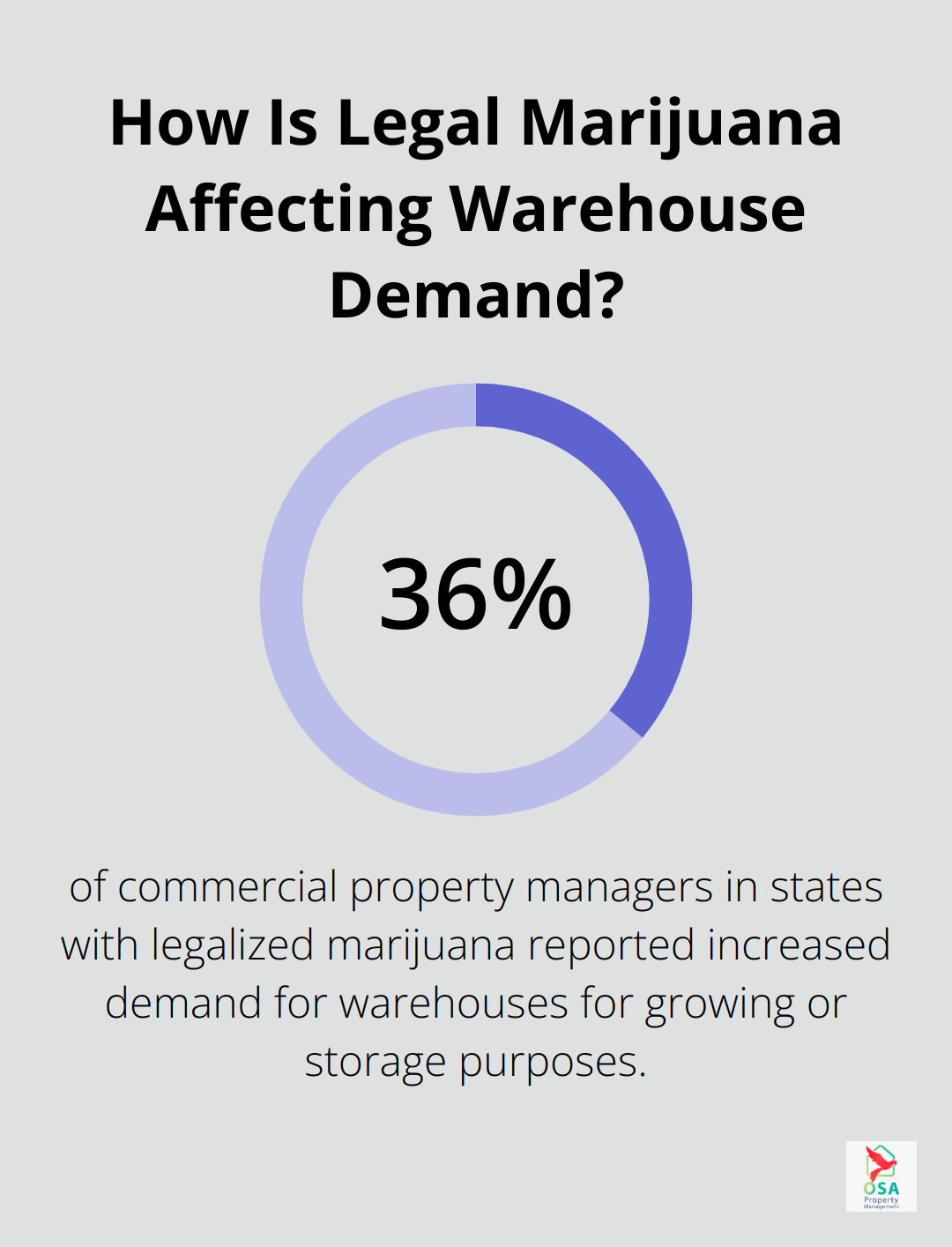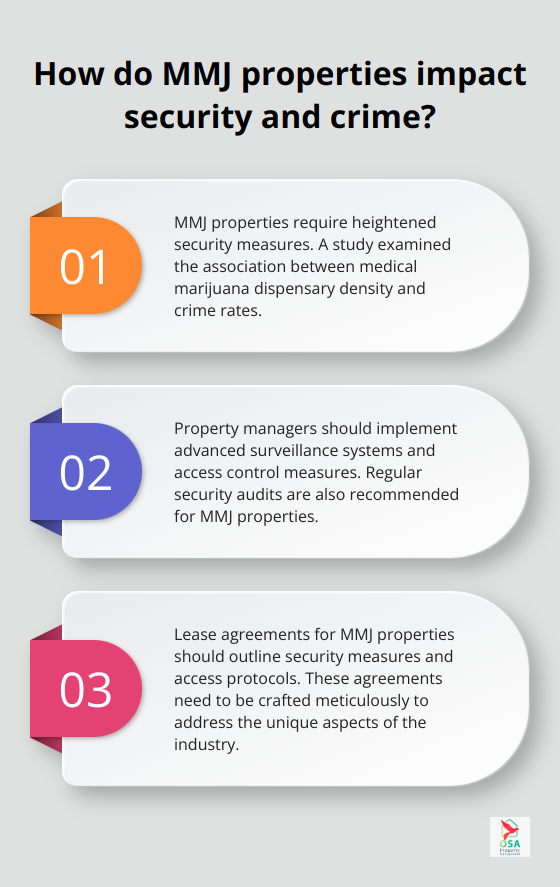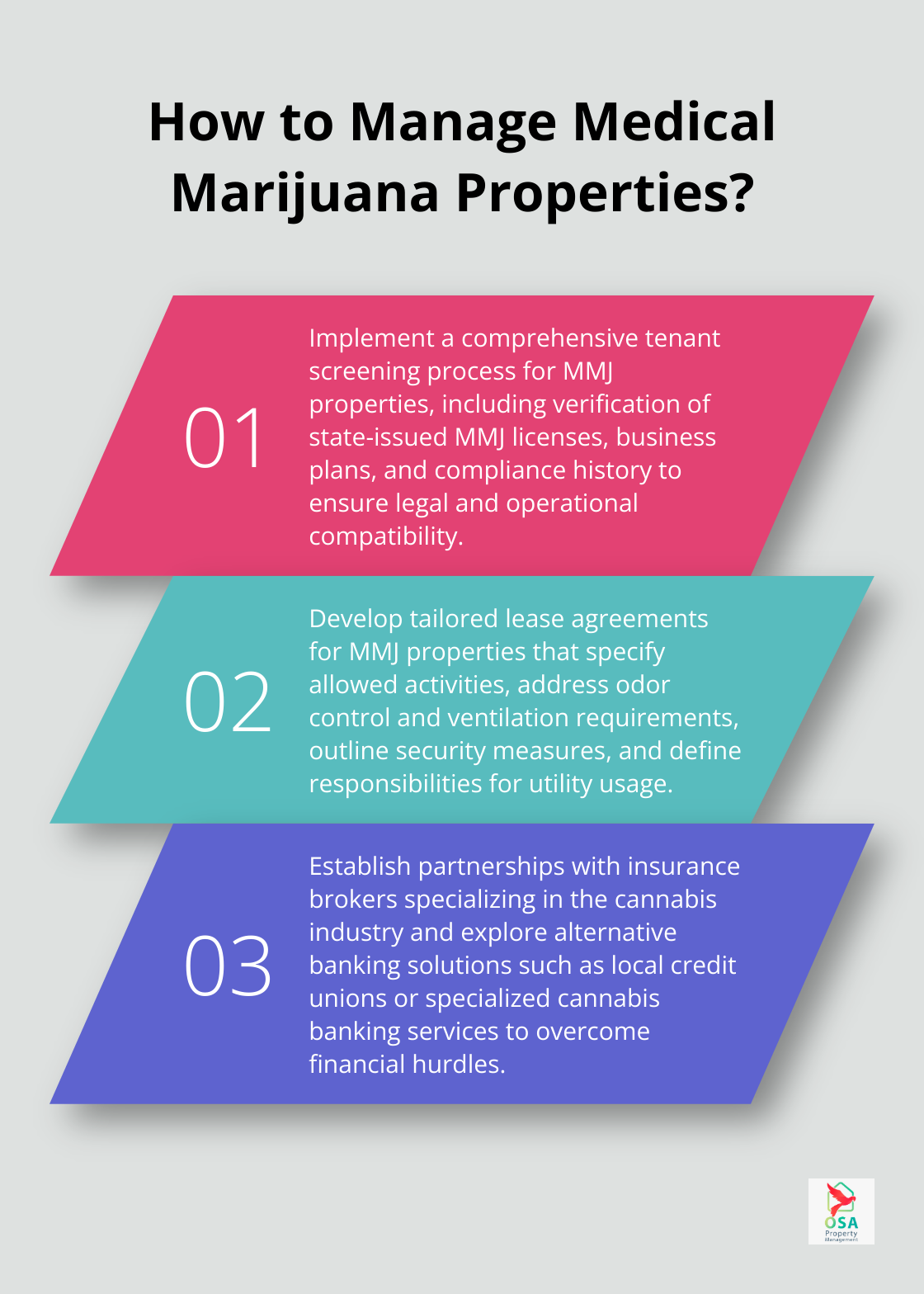At Osa Property Management, we’ve seen a growing interest in MMJ property management. This specialized field requires a unique set of skills and knowledge to navigate the complex landscape of medical marijuana regulations.
Property managers in this niche must balance legal compliance, tenant rights, and operational challenges. Our blog post will explore the key aspects of MMJ property management, providing insights for both seasoned professionals and those new to this emerging market.
What is MMJ Property Management?
Definition and Scope
MMJ property management focuses on overseeing properties where medical marijuana is grown, processed, or sold. This specialized field has experienced significant growth, particularly in states with legalized medical marijuana. Property managers in this niche must balance legal compliance, tenant rights, and operational challenges unique to the MMJ industry.
Core Services
MMJ property managers handle responsibilities that extend beyond traditional property management. These include:
- Ensuring compliance with state and local regulations
- Implementing enhanced security measures
- Managing relationships with MMJ tenants
A 2023 report by the National Association of Realtors revealed that 36% of commercial property managers in states with legalized marijuana reported increased demand for warehouses for growing or storage purposes.
Legal Complexities
Managing MMJ properties requires a thorough understanding of complex legal frameworks. For example, California property managers must know the Medicinal and Adult-Use Cannabis Regulation and Safety Act (MAUCRSA), which outlines specific requirements for MMJ businesses. Non-compliance can result in severe penalties (including property seizure and criminal charges).
Regulatory Updates
The MMJ industry evolves rapidly, with frequent regulation changes. In 2022, five states updated their medical marijuana laws (according to the National Conference of State Legislatures). Property managers must stay informed about these changes to protect their clients and tenants. This often involves regular training and consultation with legal experts who specialize in cannabis law.
Risk Management and Insurance
MMJ properties face unique risks that require specialized insurance coverage. According to a 2021 report by New Dawn Risk, there are currently about 30 U.S. insurers offering cannabis coverage, up from only 6 insurers in 2020. Property managers must work with insurance providers who understand the nuances of the MMJ industry to ensure adequate protection for their clients’ investments.

As the MMJ industry continues to grow and evolve, property managers must adapt to new challenges and opportunities. The next section will explore the key responsibilities of MMJ property managers in more detail, highlighting the specific skills and knowledge required to succeed in this dynamic field.
Managing MMJ Properties: Key Responsibilities
Rigorous Tenant Screening
MMJ property management requires a unique skill set and meticulous attention to detail. The tenant selection process for MMJ properties demands extra diligence. Property managers must verify standard financial and background information and ensure compliance with state and local MMJ regulations. This includes validation of medical marijuana licenses and understanding of the specific needs of MMJ businesses.
Proactive tenant screening is crucial for MMJ properties. Property managers should be prepared to handle requests related to marijuana use and find compromises that work for both parties. Developing a comprehensive checklist that includes verification of state-issued MMJ licenses, business plans, and compliance history is recommended.
Tailored Lease Agreements
Lease agreements for MMJ properties require meticulous crafting to address the unique aspects of the industry. These agreements should clearly outline permitted activities, compliance requirements, and potential grounds for termination related to MMJ-specific issues.

A well-drafted MMJ lease agreement should include clauses that:
- Specify allowed cultivation or processing activities
- Address odor control and ventilation requirements
- Outline security measures and access protocols
- Define responsibilities for utility usage (often higher in MMJ operations)
Property managers should collaborate closely with legal experts who specialize in cannabis law to ensure these agreements are comprehensive and enforceable.
Enhanced Security Measures
MMJ properties require heightened security measures. A study examined whether the density of medical marijuana dispensaries is associated with crime.
To mitigate potential risks, property managers should implement:
- Advanced surveillance systems
- Access control measures
- Regular security audits
Specialized Maintenance
Maintenance for MMJ properties often involves the management of high-energy consumption systems, specialized ventilation, and moisture control. Property managers must prepare to handle these unique challenges and work with contractors familiar with MMJ facility requirements.
Regulatory Compliance
The MMJ industry evolves rapidly, with frequent regulation changes. Property managers must stay informed about these changes to protect their clients and tenants. This often involves regular training and consultation with legal experts who specialize in cannabis law.
As we move forward, it becomes clear that the challenges in MMJ property management extend beyond day-to-day operations. The next section will explore the broader landscape of challenges and opportunities that shape this dynamic field.
Navigating MMJ Property Management Challenges
Insurance and Banking Complexities
MMJ property management faces significant hurdles in securing appropriate insurance coverage. The NAIC Cannabis Insurance Working Group was formed in 2018 to better understand the cannabis industry’s insurance coverage gaps and regulatory issues. This limited market often results in higher premiums and restricted coverage options.

To address this challenge, property managers should:
- Collaborate with insurance brokers who specialize in the cannabis industry
- Evaluate captive insurance solutions for larger portfolios
- Implement strict risk management protocols to potentially lower premiums
Banking remains a major issue for MMJ properties. Many financial institutions avoid working with cannabis-related businesses due to federal regulations. As a result, property managers often struggle to process rent payments and maintain business accounts.
To overcome these banking challenges:
- Explore partnerships with local credit unions that welcome MMJ businesses
- Use specialized cannabis banking services that fill this gap
- Monitor potential federal legislative changes that could ease banking restrictions
Balancing Tenant Relationships
Managing properties with both MMJ and non-MMJ tenants requires careful consideration. Conflicts can arise due to concerns about odor, security, or perceived legal risks.
To address these potential conflicts:
- Establish clear policies regarding MMJ use and cultivation in shared spaces
- Install advanced ventilation systems to reduce odor concerns
- Educate all tenants about the legal status of MMJ in your jurisdiction
- Consider designating specific areas or units for MMJ-related activities
Capitalizing on Market Growth
Despite these challenges, the MMJ market presents significant opportunities for property managers. Annual legal sales of medical cannabis are projected to grow at a 19% CAGR through 2025, to an estimated $16.3 billion (from $5.9 billion in 2020).
To take advantage of this growth:
- Develop expertise in local MMJ regulations to attract businesses seeking compliant spaces
- Network with MMJ industry associations to build relationships with potential tenants
- Consider retrofitting existing properties to meet the specific needs of MMJ businesses
- Stay informed about emerging trends in the MMJ industry, such as the increasing demand for extraction and processing facilities
Property managers who address these challenges head-on and position themselves as experts in the field can tap into the lucrative and rapidly expanding MMJ market. The key lies in staying informed, adapting to regulatory changes, and providing value-added services tailored to the unique needs of MMJ businesses.
Final Thoughts
MMJ property management presents unique challenges and opportunities in the real estate industry. The complex legal landscape, specialized tenant needs, and evolving regulatory environment demand high-level expertise from property managers. The future of MMJ property management looks promising, with continued market growth and increasing acceptance of medical marijuana across the United States.

Professional expertise in MMJ property management is essential. The intricacies of handling MMJ properties require a deep understanding of both traditional property management principles and the specific nuances of the cannabis industry. As the industry matures, we expect to see more standardized practices emerge, potentially easing current challenges related to insurance, banking, and regulatory compliance.
For those seeking expert property management services in Costa Rica, Osa Property Management offers comprehensive solutions tailored to the unique needs of property owners in the region. While not focused on MMJ properties, their extensive experience demonstrates the value of professional expertise in navigating complex real estate landscapes. The dynamic nature of the MMJ sector means that property managers must remain agile and committed to ongoing education and professional development.

